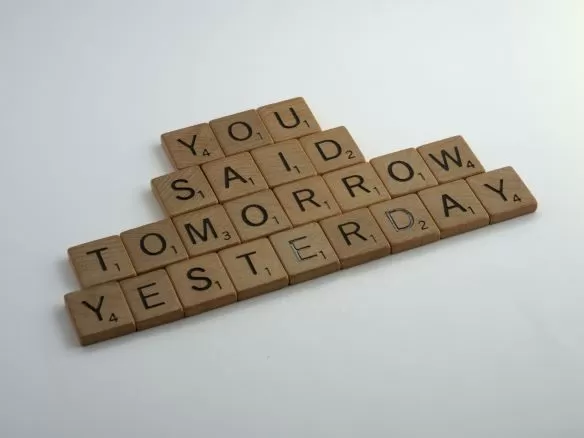
Post written by guest blogger Emily Grugan; Postbac IRTA fellow, OITE Summer Program Staff Assistant
Procrastination: we know it well. We know the annoying, nagging feeling of an incomplete (or possibly untouched) task poking at the back of our minds. We go about our day doing whatever we can (anything, everything we can) to avoid that assignment or paper or project. We even tell ourselves some rather convincing stories in an effort to justify such avoidance. Often, they involve some otherwise perfectly respectable activities (hence their high-level convincing capacities) such as cleaning the house or taking the dog for a walk*. For example, we say to ourselves, “I know I need to study for that test, but the carpets really need vacuuming and the living room tidied up. I’ll do that first. I’ll be able to focus better afterwards.” Or “I know I said I’d start going back to the gym today, but I’ve got a lot of chores that need to get done. I’ll do those today and workout tomorrow.” You likely know what your go-to procrastinatory activities are (and the stories you tell yourself that go along with them). A comical depiction of this (displayed above) describes some of these as the Four Horsemen of Procrastination: Napping, Snacks, Social Media, and Minor Chores.
A more serious take on the matter can be read about in the book, The War of Art, by Steven Pressfield. Pressfield describes procrastination as a form of what he calls “Resistance”. “Procrastination is the most common manifestation of Resistance…We don’t tell ourselves, ‘I’m never going to write my symphony.’ Instead we say, “I am going to write my symphony; I’m just going to start tomorrow.”
Fortunately, there are things that can be done to overcome procrastination or “Resistance”. Here are a few examples:
- Start by doing something that is more difficult than the task you really need to be doing. This will increase your dopamine levels and reduce the resistance you feel, allowing you to attend to the task you’ve been procrastinating*. For example:
- Take a cold shower/do some form of cold exposure
- Complete a five-to-ten-minute meditation (especially if undistracted bouts of meditation are difficult for you)
- Complete a challenging workout - Do your most challenging and/or least desirable tasks within 4 or 5 hours after waking up. This is when your physiology is more primed toward focus and alertness.
- Establish a system of accountability: Identify a person in your life that can check in with you on the progress you’re making.
- Try working on your task with the Pomodoro Technique: work for 25 to 30 minutes, break for 5 to 10, repeat. (There are lots of YouTube videos you can follow along with: https://www.youtube.com/watch?v=sTNkBeL77ks ; https://www.youtube.com/watch?v=ul8NcakAj6Y)
- From Pressfield’s book: Start thinking of yourself as a “pro”. If you act like a professional, you’re more likely to achieve professional results. In an example from his book Pressfield writes:
“Someone once asked Somerset Maugham if he wrote on a schedule or only when struck by inspiration. ‘I write only when inspiration strikes,’ he replied. ‘Fortunately it strikes every morning at none o’clock sharp.’ That’s a pro. In terms of Resistance, Maugham was saying, ‘I despise resistance; I will not let it faze me; I will sit down and do my work.”
For a fantastic and in-depth discussion on the science behind procrastination and overcoming it, see Dr. Andrew Huberman’s podcast, “Leverage Dopamine to Overcome Procrastination & Optimize Effort”: https://www.youtube.com/watch?v=K-TW2Chpz4k
*Jump to roughly 1:43:00 to hear reference to the specific examples described here.




